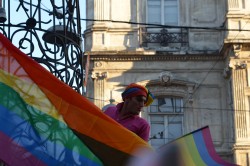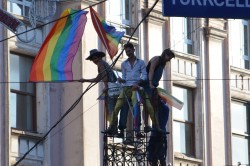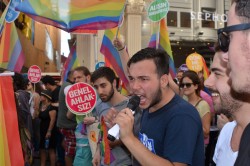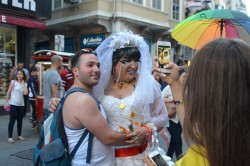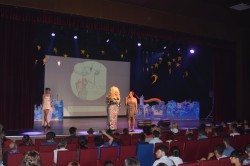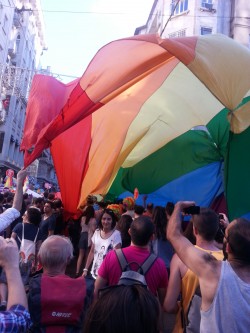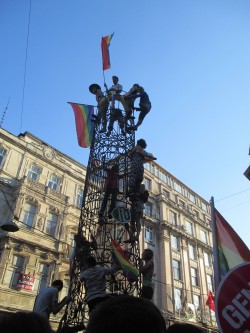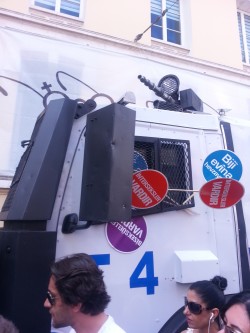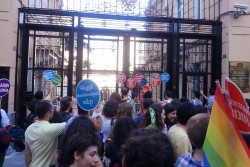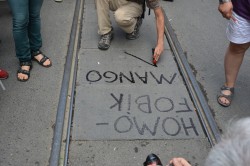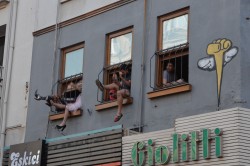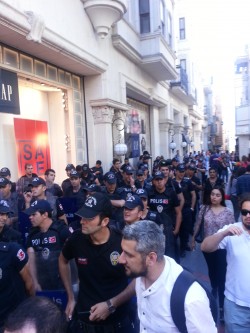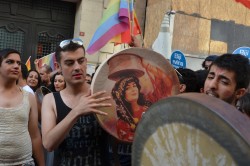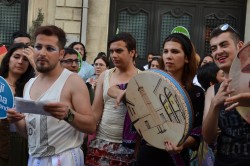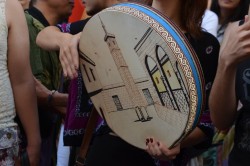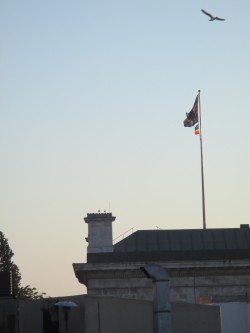Queerstanbul – Aspects of love, gender and sexuality inside daily life of LGBTIQ*
The research project is part of the seminar “Global City Istanbul” and formed up to an exhibition project. Funded by the program “Kreativität im Studium”, the Integrationsrat Göttingen and the University of Göttingen the group visited Istanbul once again during the Pride Week 20014. The results of the research were shown in Göttingen during an exhibition in December 2014.
Text by Susanne Klenke and Laura Stonies
Shortfilm by Margaux Jeanne Erdmann
The district Beyoğlu is situated in the center of Istanbul’s European side. By the end of the year 2012, Beyoğlu had nearly 250.000 residents. İstiklal Caddesi, the largest shopping street of Istanbul, starts at Taksim Square and extends about 2 km to the historic narrow-gauge railway station Tünel. In side streets off İstiklal, shops, bars, cafés and restaurants sit close together. Every day, a dense mass of thousands of people flows over the asphalt until the early morning hours. The queer center of the city lies here. Thus, in one of these side streets near Taksim Square, the oldest gay bar of Istanbul, “Morkedi/Café de Paris”, is located.
Homo- and transsexual people are more visible in Beyoğlu’s cityscape than in other parts of the metropolis. In conversations, homo- and transsexual persons stated that the public LGBTIQ* everyday life as well as the higher visibility of homosexuals and transsexuals in Beyoğlu stems from increasing internationalization mainly influenced by tourism. Several statements illustrate the downtown area’s specific atmosphere and status within urban culture. Compared to other parts of the city, a free and open life is possible and, furthermore, socially accepted.
“Downtown area of Istanbul is open minded. People are open minded. But people in Anatolya, Kapadokya, Pamukkale, people are not open minded! […] You can see all of gay man at Taksim square district and maybe you don’t recognized you can see all the lesbian in the streets as well. But we are talking about Taksim. Kadiköy, Shishane. But if you go to the suburbs like … you know. Not downtown even a man and woman […] cannot walk hand in hand. This is not only for gay people.” (CEO Pride Travel Agency)
Every year since 2003, the group “LGBTI Istanbul” has organized Istanbul’s LGBTIQ* Pride March. After modest beginnings with 30 participants in its first year, July 2013 saw thousands of homo-, bi- hetero- and transsexuals opposing Turkish Prime Minister Erdoğan and homophobia with Gezi Park-protesters in Taskim square expressing their solidarity. The number of participants increased immensely to 50.000 in 2013 and redoubled in 2014 with approximately 100.000 participants. The LGBTIQ* Pride March is considered the biggest Pride Event in South Eastern Europe. Despite this public expression of queer sexual identities, homo- and transphobia still pose a severe problem.
Pridemarch 2014
- © Queerstanbul 2014
- © Queerstanbul 2014
- © Laura Stonies 2014
- © Queerstanbul 2014
By 2014, various groups, individuals and organizations had gotten involved in the organization. In Istanbul, Pride Week begins with the Trans Pride March on Sunday and ends with the Gay Pride March the following weekend. The separate marches originate from Trans groups having been underrepresented in LGB contexts and not feeling accepted. Therefore, they demanded a March of their own. In recent years, the audience of the Marches mixed and many people attended both demonstrations.
At the end of May 2014, we travelled to Istanbul for the first time. During our week-long stay, we made initial contacts and gained first insights into Istanbul’s queer life. We met many different activists concerned with queer life, advocacy and resistance who let us into their life for a moment, told us their stories, eased our introduction to the queer networks of the city and were of great help in getting to know the city’s queer life.
The aim of our second research trip was to deepen established contacts and gain better access to the field. Pride Week provided us with a good opportunity to document the diversity of queer life and activism. This is how, in June 2014, we were part of the 100.000 visitors of Pride Week protesting, singing, dancing and celebrating for the rights of LGBTQ*. In the spirit of that year’s Pride’s motto, “Temas” (contact), we accompanied queer people in Istanbul, took part in forums, panels and workshops, interviewed, spoke to and debated with Pride visitors, organizers, hosts, artists and activists.
Hormonlu Domates
As a form of public resistance to the media’s portrayal of LGBTIQ*, the Hormonlu Domates Homofobi ve Transfobi ÖDÜLLERI (“Genetically Modified Tomato Homo / Trans / Biphobia Awards”) was founded in 2005 and is organized by LambdaIstanbul. It is awarded to public figures that made homo-, trans- or biphobic statements in the media. The event’s name was chosen in reference to athlete Erman Toroğlu’s statement that genetically manipulated tomatoes would be responsible for people becoming homosexual 1.
The public award ceremony was held in June 2014 in the old cinema of the municipality of Şişli’s cultural center. Mademoiselle Coco chaired this event complemented by performances of queer artists. As a self-empowerment strategy of LGBTIQ* organizers and visitors, the recipients were first projected on a big screen. Their statements were played again during the nomination as a parody and deconstruction of the statements. None of the nominees appeared to accept the award.
Appropriation of public space (during the march)
- © Mehmet Gündüz 2014
- © Queerstanbul 2014
- © Mehmet Gündüz 2014
Crucial elements of the marches were the rainbow and Trans flags. The participants were covering İstiklal Street in its length and whole width with huge rainbow flags, waving and swinging them. Besides these giant flags carried through İstiklal Street in a collaborate effort, so-called Lollipops, protest signs in the shape of a circle, contributed to the creativeness and detail-rich composition of the Pride March. As an act of protest, these Lollipops were also utilized during the marches to label and annotate certain objects such as the police’s water cannons, shops and stores along İstiklal Street and, for example, the entrance gate of the Russian consulate.
- © Mehmet Gündüz 2014
- © Mehmet Gündüz 2014
- © Mehmet Gündüz
Furthermore, viewers and visitors gathered on the balconies, windows and rooftops of the surrounding buildings. Starting at Takism Square, the ending point of the Pride March was Tünel, where the artwork of artist Ayse Erkmen, a huge tower built in 1994, is located. Again, people ascended and decorated the tower with Lollipops and rainbow flags.
Agreement Erdogan Regierung
There is an informal “agreement” with the municipal authorities that the state agencies not interfere with the demonstration. Therefore, the Pride March is the only demonstration not interrupted by police. This is also related to the strong interest of Western media and press representatives documenting the March and reporting on it. A young member of the organizational team old us:
“But the only demonstration they let is the LGBTI-Pride here in Istanbul. We think that international solidarity is the major support that we have. In Europe we have a strong network here so we can make our voices heard by other people in Europe. It’s like a pressure on Turkish government.”
Nevertheless the march was attacked by the police in 2015. 2
Minorities at the March
- © Mehmet Gündüz
- © Mehmet Gündüz
- © Mehmet Gündüz
This example of a Kurdish Trans group illustrates that the Pride March provides a platform for demands for political and social recognition and to demonstrate ethnic and political identities. Moreover, it is a chance to call attention to intersectional discrimination.
Here, the demonstrating group used imaginations of traditions to contribute to and take part in the Pride March. By wearing clothes labeled as traditional such as hair bands in the Kurdish colors green, yellow and red, playing musical instruments like drums, using dance and sounds, they express their Kurdish identity. Using visual and auditory media, their transsexuality as well as Kurdish identity becomes visible, audible and, thus, noticeable. As the only demonstration in Istanbul tolerated without interference, the March provides minorities with the opportunity to call attention to their isolation and exclusion from mainstream society, to break the silence, to demonstrate resistance and to put their situation on the agenda.
Transnational solidarity relationship in the organization of Pride Week
Within the organizational structures of the Pride March, transnational relations play an important role. The demonstration receives support from Western European countries and their state representatives in Istanbul. For example, the British consulate raised the rainbow flag on the day of the Pride March. The Dutch and the Swedish consulates opened their gates for events and support the activists financially. A commercialization of the Pride Week, such as sponsorship of individual companies, though, is rejected by the activists.
“I mean these changes are happening really rapidly in a way because the movement is going for 22 years in Istanbul and Turkey as well. But at the same time these 22 years are efficient enough to finance any economic sources. But one point is really important for Pride: We are not taking sponsorship; we are not working with any firms. Non-profit-events are happening.”
LamdaIstanbul situated the onset of international solidarity, support, cooperation and assistance in the year 2007. (Homepage Lambda)
“It’s not only happening by itself in Istanbul, it brings all people from Turkey and Kurdistan. At the same time it is also a nice place as Pride to express your own existence from Iran, Syria and Balkan as well.” (Activists from the organization team)
There is no financial funding by the Turkish government. When inquiring about this in regard to the funding of the Pride Week, a young activist of the organization team told us:
“There is no aim that the government is supporting the LGBT-activism or the LGBT-social rights in Turkey. And also they have an open homophobia politic. Recently they shouted from the parliament that we are sick, that for Turkey LGBTI-rights is not important at all. […] We organized parties in our community. We gather people and collect funds for Pride Week. Other than that it’s mostly the European Consulates here supporting the Pride Week. This is how we gather funds actually.”
Fußnoten:
- 1 “Hormonlu domates yemeyin homoseksüel olursunuz.”, 2005 ↩
- 2 http://www.kaosgl.com/page.php?id=19733 and http://lgbtinewsturkey.com/2015/06/28/press-statement-for-istanbul-2015-lgbti-pride-march/ (last accessed on July 7, 2015 ↩
Some districts of Istanbul like Beyoğlu are considered to be safe for lesbians, gays, bi- and transsexuals and shaped by the queer scene. In recent years, Istanbul has experienced a boom of gay bars and pubs, clubs and hostels. It is conceived as a metropolis with a flourishing and vibrant urban gay scene – also by tourists.
As part of the tourism business of the city, a gay travel agency is specializing in queer visitors. The employees of the agency as well as their tour guides are either homosexual or “gay friendly”. The offered touristic services vary from night tours of the local nightlife’s hot spots to day tours of the city and wider urban sphere as well as trips to different cities lasting several days. During the tours, the customers are acquainted with facts regarding the city of Istanbul and its history as well as an LGBTIQ* perspective on aspects of everyday life.
A closer inspection of on the digital offers provides information about the demands, needs and expectations of tourists regarding Istanbul as a destination. Hamam, Oriental Night, Bazar and Hagia Sofia – these locations within the urban space are the advertised as highlights the agency offers. These are also the offers experiencing highest customer demand. This illustrates that an Oriental image of the city is part of the tourists’ imaginations – they expect it and strive to fulfill it through their urban route. Touristic offers consist even of Orientalized places like a traditional Hamam, the Grand Bazar or the Blue Mosque.
Tourism Studies within the Cultural Sciences point out that the search for authenticity of, in this case, a city is what drives tourists. 1 Since the beginnings of commercial tourism, one of the traditional motivations to travel is the search for authenticity. Thus, the tourist becomes a symbol for the modern individual searching for the original. 2 No only spatial demands by tourists, but also on their questions about homosexual life in Turkey, which the gay tours are all about, can be seen in this context. Using gay tourist services serves as a practice of distinction as it constitutes a special and “authentic” arrangement of entertainment and knowledge – even though the “genuine” and authentic itself, as Ning Wang states, is a construction. 3 This travel motivation turns the tourist to a traveler. Within these mechanisms of distinction, the gay tourists distinguish themselves from conventional tourists and their travel routes within Istanbul.
During our field research, we had the opportunity to visit the only gay travel agency in Turkey. There, we met the lesbian agency owner for an interview allowing us to gain insight into the economic aspects of this sector of customer service. During the conversation, the owner reported that she only works with Western customers. In the initial phase of the company’s operation, cooperation with Turkish enterprises like hotels had been very difficult. When asked for collaborations, the CEO reported, people expressed their unwillingness to serve “that way of customers“ and declined inquiries with phrases such as “No, you are pervert and you bring more perverts to Turkey.”
With increasing numbers of customers and the resultant increase in economic potency, cooperation became easier. Tour operators, restaurants and hotels expressed more liberal positions towards the clientele connected to a million dollar business: “At the moment it’s good because they are more polite. They are okay, who cares? Gays or straight? Tourist, tourist – customer, customer!” This is how D. analyzed the current situation.
But within the Turkish service industry, the company plays a dual role. For example, the agency’s website is inaccessible for Turkish people. In locking the site, government agencies and public actors prevent people from within Turkey from gathering information on queer services, locations and contacting the agency. In seemingly diametrical opposition to the attitude demonstrated through censorship, the Culture and Tourism Ministry aspired to use the agency to create the image of a cosmopolitan, liberal city for Istanbul. A few years ago, the owner told us, the Minister of Culture and Tourism at the time asked her to present her company at a trade show in Barcelona to promote a gay agency in Western Europe. In this conversation, he pointed out that this type of advertising is important for the Turkish government as the existence of such an agency contributes to a liberal and open minded image of the county.
The Tourism-Minister called me and said ‘we have an exhibition in Barcelona and we want you to be there. This is very important for our government. As a Gay Travel-Agent, be there, please!’ They wanna show to Europe and the other world ‘we have a Gay Travel-Agent which is openly and freely, they can work in our country!’
At present, the agency’s homepage is still blocked.
Another example of economically driven open mindedness in the treatment and perception of homosexual clients is the sector of cruise tourism. Since the Arab Spring changed the political situation in Tunisia, Egypt and Morocco, several gay cruises redirected their routes and call at Istanbul as part of their tours. While many were initially hostile towards this development, the situation changed and passengers were increasingly seen as welcome guests after the huge profits to be made with the accommodation of cruise ships had become apparent. Presently, a hundred Gaycruise cruise ships berth in Istanbul every year. “And then they think ‘a million dollars, hm, who cares if they are gay? A million dollars are more important’”, D. summarized the changes in opinion.
The agency owner also placed the social acceptance of Turkish homosexuals in the context of economic and neoliberal factors: “I have no problem because of being gay. I’m in a very good situation. This is luxury.”
In conclusion, the people in tourist-oriented industries and locations tend to be more open towards LGBTIQ* due to their knowledge that a more open attitude is necessary to profit from this clientele: „Because people are working in the tourism business and they know that they have to be open minded.“ Here, the economic coaction of tourists and players of the service sector evokes a cultural dynamic. The adaption of an expected open minded attitude towards queer customers is connected to an assumed change of society. In this manner, the touristic encounter becomes a performance framework for new patterns of activity.
“They are liberal but only because of the tourism business. Not because the people are open minded. Because the people are working in the tourism business and they know that they have to be open minded.” (CEO D.)
Yet, financial capital is generally a significant factor regarding the opportunity of living a free life for Turkish LGBTIQ*. Status and social acceptance are connected to the economic position of homosexuals. “Money is the most important thing. With money you can have your freedom.”
Other actors within the gay scene in Istanbul also expressed the opinion that it was easier for people with higher social status and economic capital to live openly gay. But the queer scene’s service sector also provides employment opportunities for low-income workers. Visiting bars and clubs of the scene, we gathered that most of the young boys working in such places had come to Istanbul from villages and smaller towns all over Turkey. One reason for this interior migration lies in the general configuration of the labor market: The variety of clubs, bars, cafés, hotels etc. provides even unskilled workers with a chance to find a job. Beside this, Istanbul holds the opportunity to live a more open and free life for queers. The gay subculture can enable individuals to experience new forms of identities “as they constitute desirable destinations of safety and comfort against a variety of threatening forces.” 1
“We have to be in the closet, but it’s a whole big scene.” (Fashion designer)
Fußnoten:
- 1 Fortier, Anne-Marie: “‘Coming home’ Queer migrations and multiple evocations of home“, European Journal of Cultural Studies 11 (2001) 4, pp. 405-424, here p. 406. ↩
During the Pride Week in June 2014, we met Merve C. at a discussion panel on “Sex Laboratory” Merve participated in as representative of the Trans Solidarity Networks. She invited us to her home the Sunday morning before the Gay Pride March and told us about her daily life, professional difficulties she was facing and how she earned her living as a sex worker. Also, she spoke about the Trans Movement and the significance it holds for her. The visit is documented in the short film “Breakfast at Merve’s” by Margaux J. Erdmann:
Judicial situation in Turkey
Only in 1988, a legal procedure for name and sex changes of transsexuals was established with the introduction of an additional paragraph to Art. 29 of the Turkish Civil Code. As a consequence, a person’s entry in the civil register can be amended after a “successful sex change“. 1 The starting point of this development was brought about by a transgender woman who had sex reassignment surgery abroad and then wanted to modify her civil registration entry.
Since 2002, Art. 40 of the Turkish Civil Code also regulates the pre- and post -operational procedures of a sex change: 2 Anyone wanting to change their sex may apply in person for the court’s permission of the sex change. For the permission to be granted, the applicant must be at least eighteen years of age and unmarried, must provide the official Health Commission with a report obtained from a teaching hospital stating that their “transsexual nature” makes a sex change absolutely necessary for their mental health and that the person concerned permanently renders themselves infertile. If the official Health Commission confirms that the operation corresponding to the permission granted has been accomplished, the court decides on adjustments to be made in the birth register. According to this legislation, transsexuals wanting to adjust their sex in the civil register are forced to provide a medical certificate certifying their sexual identity. This legally pathologizes transsexuality. The fact that the sex reassignment surgery necessary for a sex change is accompanied by mandatory sterilization is also to be critically considered.
Fußnoten:
- 1 Atamer, Yesim M.: “Türkei“, in: Basedow, Jürgen/Scherpe, Jens (eds.): Transsexualität, Staatsangehörigkeit und internationales Privatrecht. Entwicklungen in Europa, Amerika und Australien, Tübingen: Mohr Siebeck 2004, pp. 74-79, here p. 74. ↩
- 2 Atamer, Yesim M.: “Türkei“, in: Basedow, Jürgen/Scherpe, Jens (eds.): Transsexualität, Staatsangehörigkeit und internationales Privatrecht. Entwicklungen in Europa, Amerika und Australien, Tübingen: Mohr Siebeck 2004, pp. 74-79, here p. 76 ↩

